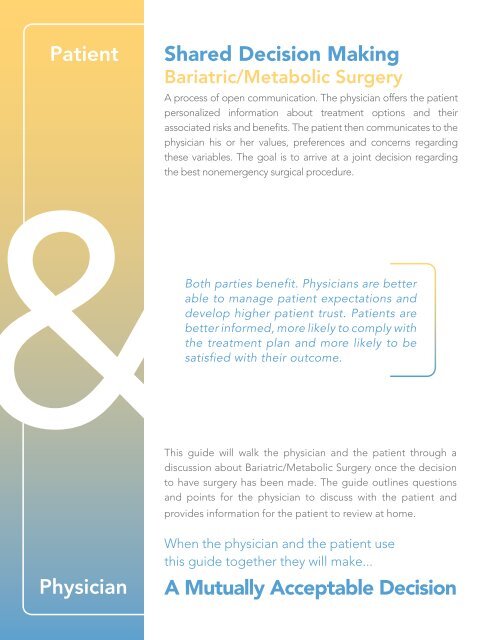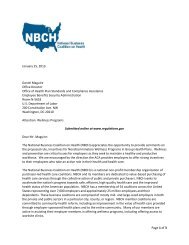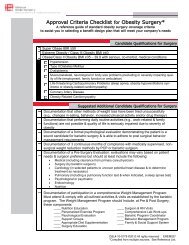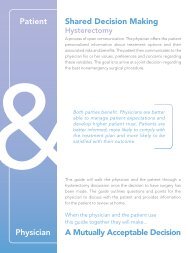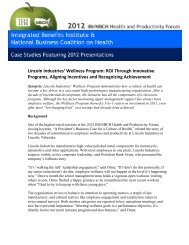Shared Decision Making Patient Physician A Mutually Acceptable ...
Shared Decision Making Patient Physician A Mutually Acceptable ...
Shared Decision Making Patient Physician A Mutually Acceptable ...
Create successful ePaper yourself
Turn your PDF publications into a flip-book with our unique Google optimized e-Paper software.
<strong>Patient</strong><br />
<strong>Shared</strong> <strong>Decision</strong> <strong>Making</strong><br />
Bariatric/Metabolic Surgery<br />
A process of open communication. The physician offers the patient<br />
personalized information about treatment options and their<br />
associated risks and benefits. The patient then communicates to the<br />
physician his or her values, preferences and concerns regarding<br />
these variables. The goal is to arrive at a joint decision regarding<br />
the best nonemergency surgical procedure.<br />
Both parties benefit. <strong>Physician</strong>s are better<br />
able to manage patient expectations and<br />
develop higher patient trust. <strong>Patient</strong>s are<br />
better informed, more likely to comply with<br />
the treatment plan and more likely to be<br />
satisfied with their outcome.<br />
This guide will walk the physician and the patient through a<br />
discussion about Bariatric/Metabolic Surgery once the decision<br />
to have surgery has been made. The guide outlines questions<br />
and points for the physician to discuss with the patient and<br />
provides information for the patient to review at home.<br />
<strong>Physician</strong><br />
When the physician and the patient use<br />
this guide together they will make...<br />
A <strong>Mutually</strong> <strong>Acceptable</strong> <strong>Decision</strong>
Table of Contents<br />
For the <strong>Physician</strong><br />
• Put Your <strong>Patient</strong>’s Mind at Ease<br />
• Review the Risks of Morbid Obesity<br />
• Reinforce the Health Benefits of Weight Loss<br />
• Discuss Your <strong>Patient</strong>’s Candidacy for Bariatric Surgery<br />
• Emphasize the Importance of Behavioral<br />
and Psychological Readiness<br />
• Explain Bariatric Surgery<br />
• Provide the Benefits of Bariatric/Metabolic Surgery<br />
• Provide Complication Data<br />
• Manage Long-term Expectations<br />
• Refer Your <strong>Patient</strong> to a Center of Excellence<br />
Bariatric Surgery Program<br />
For the <strong>Patient</strong><br />
• Feel Good about Your <strong>Decision</strong><br />
• What Is Bariatric Surgery?<br />
• Understand the Risks and Benefits<br />
• Recovering from Surgery<br />
• Set Realistic Goals and Expectations<br />
• Find Out If You Qualify<br />
• Check Your Insurance Coverage<br />
Official Recommendations<br />
Informational Websites<br />
Ask Your Surgeon Questions<br />
References<br />
Note: Click on any of the content contained in the Table of Contents to link directly to that section.
For the <strong>Physician</strong><br />
Put Your <strong>Patient</strong>’s Mind at Ease<br />
£ Most insurance plans require additional documentation<br />
that confirms:<br />
£ Reduce your patient’s stress. Help them understand<br />
they have had a long battle and this is a difficult decision • other methods of weight loss have been unsuccessful<br />
requiring lifelong commitment.<br />
• performance of daily activities is seriously impaired<br />
£ Dispel myths and discuss the benefits of this surgery as • psychological evaluation demonstrating that the<br />
outlined below.<br />
patient is able to adhere to post-surgical behavior<br />
£ Provide patient education information.<br />
management requirements<br />
• patient demonstrates compliance with a 3- to 6-month<br />
Review the Risks of Morbid Obesity<br />
presurgical weight reduction program<br />
£ Obesity multiplies the risk of developing medical<br />
• patient is free of any substance abuse problems,<br />
conditions by 2- to 5-fold. 1, 3<br />
including smoking<br />
£ An estimated 300,000 deaths per year are caused by £ Female candidates who are in their childbearing years —<br />
obesity-related conditions. 2<br />
about 80 percent of morbidly obese adults in the<br />
Many patients with morbid obesity are not fully aware of U.S. — should be willing to wait at least one year after<br />
their comorbidities or of the relationship between these surgery before becoming pregnant. 14<br />
conditions and their weight. 4<br />
Emphasize the Importance of Behavioral<br />
Reinforce the Health Benefits<br />
and Psychological Readiness<br />
of Weight Loss<br />
£ Bariatric surgery is an adjunct, not an alternative, to<br />
Bariatric surgery has been shown to be a highly effective<br />
lifestyle changes.<br />
means of achieving lasting weight loss in the majority of • Entails a lifetime commitment to following dietary<br />
patients, resulting in significant reduction or resolution of: 5–13 restrictions, adhering to an exercise program,<br />
• type 2 diabetes<br />
• arthritis/joint pain<br />
taking dietary supplements and complying with<br />
follow-up recommendations<br />
• insulin resistance<br />
• depression<br />
• There may be complications that require<br />
• metabolic syndrome • obstructive sleep<br />
subsequent procedures<br />
• hypertension<br />
apnea<br />
• There may be unpleasant side effects over a period<br />
• dyslipidemia<br />
• sexual dysfunction<br />
of several years<br />
• Gastroesophageal Reflux<br />
£ Determine whether your patient:<br />
• menstrual irregularity<br />
Disease (GERD)<br />
• Is well-informed and highly motivated<br />
• Polycystic Ovary<br />
• asthma<br />
Syndrome (PCOS) • Has a supportive family or social environment<br />
The most dramatic outcomes are seen in those who lose<br />
• Does not smoke or drink alcohol<br />
the most weight and maintain the loss. 5<br />
• Does not have untreated severe depression or<br />
other mental disease<br />
Discuss Your <strong>Patient</strong>’s Candidacy for<br />
Bariatric Surgery<br />
Explain Bariatric Surgery<br />
£ Bariatric surgery as a treatment for morbid obesity is an<br />
There are insurance requirements for surgery, which are<br />
accepted option for severely obese patients who do not<br />
outlined below. The bariatric program will work with your<br />
respond to nonsurgical treatment.<br />
patient to help meet these requirements; however, it is<br />
1, 2 Bariatric surgery is<br />
comprised mainly of 4 types of procedures:<br />
important for the patient to understand these requirements<br />
ahead of time.<br />
• restrictive (gastric banding, sleeve gastrectomy)<br />
£ Clinical criteria:<br />
• malabsorptive (gastric bypass)<br />
• 18 years or older<br />
• combination (biliopancreatic diversion or BPD)<br />
• BMI of 40 or greater<br />
£ Discuss the option of minimally invasive<br />
(laparoscopic) surgery.<br />
• BMI of 35 or greater plus at least<br />
1, 14<br />
one serious comorbidity • Most bariatric procedures are now performed<br />
laparoscopically, with comparable efficacy to open<br />
£ Bariatric surgery may also be considered as a treatment<br />
procedures<br />
option for those with mild to moderate obesity and type<br />
23 (Thomson-Reuters, 2010)<br />
2 diabetes. 14, 15 • Advantages include fewer wound complications, less<br />
postoperative pain, a shorter hospital stay and quicker<br />
postoperative recovery 14
For the <strong>Physician</strong><br />
• The least invasive and safest procedure, the laparoscopic<br />
adjustable gastric band (LAGB), is available on an<br />
outpatient basis in certain specialized centers 16<br />
Provide the Benefits of<br />
Bariatric/Metabolic Surgery<br />
£ Communicate the benefits of the surgery, especially for<br />
patients who have comorbidities.<br />
Benefits of Bariatric/Metabolic Surgery Specific<br />
to Diabetes — Bariatric Surgery Can:<br />
• Resolve or improve diabetes (78.1% resolved,<br />
86.6% improved or resolved) and other obesityrelated<br />
comorbidities 22<br />
• Reduce medication use for diabetes (down 75% after<br />
12 months) and other comorbidities 24<br />
• Offer a more cost-effective option than standard therapy<br />
for diabetes — with laparoscopic surgery costs fully<br />
recovered after 26 months 21<br />
£ Communicate the latest surgery safety information.<br />
Bariatric surgery can:<br />
• Offer a safety profile that has improved significantly<br />
in recent years, with increased safety associated with<br />
17, 25<br />
increased procedure volume<br />
• Result in morbidity and mortality rates that are similar to<br />
well-established procedures such as gallbladder surgery<br />
26, 27<br />
and hysterectomy<br />
Provide Complication Data<br />
£ Communicate the risks inherent in any surgery and the<br />
risks unique to abdominal surgery, bariatric surgery and<br />
each procedure. An analysis of complication data related<br />
to 12 different types of bariatric surgery found:<br />
• 7.3% of patients overall had one or more perioperative<br />
complications, predominantly non-life-threatening, such<br />
as wound problems 17<br />
• The rates of serious complications (potentially lifethreatening,<br />
permanently disabling or fatal) were<br />
highest in gastric bypass procedures (3.1%) and lowest<br />
in adjustable gastric band procedures (0.78%) 17<br />
• Complication rates are lowest in high-volume centers<br />
with surgeons experienced in bariatric surgery 2<br />
£ Outline possible postoperative complications such<br />
as infections, seromas, dehiscence and hernias.<br />
• Laparoscopic techniques have reduced these<br />
risks substantially 18<br />
• Problems specific to gastric banding procedures can<br />
include band intolerance, infection or migration and<br />
tubing-related complications, such as port discomfort<br />
or disconnection, tube kinking or tube or port leakage 5, 8<br />
£ Place these risks into perspective for your patient based<br />
on his or her health status.<br />
Manage Long-term Expectations<br />
Talk to your patient about the recovery process, including<br />
diet and activity.<br />
£ Immediate postoperative care is provided by the surgeon,<br />
preferably in conjunction with a multidisciplinary team.<br />
£ Long-term care and follow-up are provided by the<br />
primary care physician and the bariatric surgeon. The<br />
patient should see his or her PCP every three months<br />
for the first year and at least annually thereafter. 18<br />
Discuss the timing of the follow-up with your patient<br />
and his/her surgeon.<br />
• Long-term complications may include nutritional<br />
deficiencies, bone loss, gallstones, GERD, incisional<br />
hernias, staple line failure, stricture, ulcers and excess<br />
skin folds<br />
• Some complications may require additional<br />
surgical procedures<br />
• Insufficient weight loss may require reoperation, with<br />
conversion to gastric bypass in cases where gastric<br />
banding does not achieve the desired results<br />
£ Most patients achieve a 40–70% loss of excess weight<br />
within 2 to 3 years of surgery, along with mitigation<br />
or resolution of related health problems such as<br />
metabolic syndrome, hyperlipidemia, type 2 diabetes<br />
and hypertension. 14<br />
£ Quality of life scores for self-esteem, physical activity,<br />
social life, work conditions and sexual activity improve<br />
substantially and are strongly correlated with the amount<br />
of weight lost. 5<br />
£ Success after bariatric surgery depends largely upon<br />
a patient’s personal diligence in following dietary<br />
recommendations and complying with follow-up care.<br />
Refer Your <strong>Patient</strong> to a Center of<br />
Excellence Bariatric Surgery Program<br />
£ Explain to your patient the next steps with a referral.<br />
£ Know which surgeons in your market are Center of<br />
Excellence providers. Visit the COE website to explore<br />
beyond the patient’s insurance carrier’s COE network:<br />
www.acsbscn.org<br />
Talk to your patient about options, concerns and expectations.<br />
An informed patient is a better patient.
<strong>Shared</strong> <strong>Decision</strong> <strong>Making</strong><br />
Bariatric/Metabolic Surgery<br />
For the <strong>Patient</strong><br />
<strong>Physician</strong> Provides<br />
Treatment Options<br />
Risks and Benefits<br />
Experience and Skill<br />
<strong>Mutually</strong><br />
<strong>Acceptable</strong><br />
<strong>Decision</strong><br />
Personal Preferences<br />
Values and Concerns<br />
Lifestyle Choices<br />
<strong>Patient</strong> Provides
For the <strong>Patient</strong><br />
Feel Good about Your <strong>Decision</strong><br />
If you are considering bariatric surgery, you have most likely<br />
tried many other weight loss methods without success. You<br />
may already have begun the process of learning as much as<br />
you can about it, both from other patients and from the many<br />
patient education materials available. But is it right for you?<br />
The best way to reach an informed decision is to engage in<br />
an open and frank discussion with your doctor in which you<br />
can express your concerns, explore all your options and<br />
have your questions answered. You should feel confident<br />
that you understand everything fully and that together, you<br />
and your doctor are making the decision that is best for you.<br />
What Is Bariatric Surgery?<br />
Bariatric surgery is an operation<br />
that will reduce the amount of<br />
food you can take in by creating<br />
a smaller stomach, reducing the<br />
absorption of calories or both.<br />
Surgery can often be performed<br />
using laparoscopic, or minimally<br />
invasive, techniques, which shortens<br />
healing time and reduces the<br />
likelihood of some complications.<br />
No single procedure is right for<br />
everyone. As you explore surgical<br />
options with your doctor, you can<br />
come to an informed agreement<br />
about which is the best choice for<br />
you. Standard procedures include:<br />
• Laparoscopic adjustable gastric<br />
band (LAGB) — a gastric band<br />
is wrapped around the upper<br />
stomach to limit food intake<br />
and slow the progress of food<br />
through the digestive system.<br />
The band is connected by a<br />
thin, soft tube to a port inside<br />
the abdomen; this allows the<br />
band to be adjusted.<br />
• Laparoscopic sleeve gastrectomy<br />
(LSG) — approximately threefourths<br />
of the stomach is<br />
removed, leaving your stomach<br />
about the size of a peeled<br />
banana. Food and nutrients are<br />
digested and absorbed in their<br />
usual order, but the amount of<br />
food that can be eaten is limited<br />
by the smaller stomach size.<br />
• Open or laparoscopic gastric<br />
bypass — the surgeon creates<br />
a small stomach pouch using<br />
staples, then attaches a section<br />
of the small intestine directly to<br />
the pouch, allowing food and<br />
nutrients to bypass a portion of<br />
the small intestine where they<br />
are normally absorbed.<br />
• Biliopancreatic diversion (BPD) — the stomach is reduced<br />
in size as with sleeve gastrectomy, but in addition, a<br />
significant portion of the small intestine is bypassed,<br />
decreasing both food intake and absorption of calories<br />
and nutrients.<br />
Understand the Risks and Benefits<br />
There are risks with any surgery, such as adverse reactions<br />
to medications, problems with anesthesia, problems breathing,<br />
bleeding, blood clots, inadvertent injury to nearby organs<br />
and blood vessels, even death. Bariatric surgery has its own<br />
risks, which your doctor will explain to you. They include<br />
potential short-term problems related to the surgery, such<br />
as wound complications, as well as longer term problems,<br />
such as malnutrition or problems related to implanted
For the <strong>Patient</strong><br />
devices. Your doctor will help you place these risks in<br />
perspective based on your own health and medical status<br />
and weigh them against what you stand to gain:<br />
• Increase life expectancy by 89% 19<br />
• Reduce risk of premature death by 30–40% 6<br />
• Reduce risk of death from diabetes by 92% 20<br />
• Reduce risk of death from cancer by 60% 20<br />
• Reduce risk of death from coronary artery<br />
disease by 56% 20<br />
Recovering from Surgery<br />
Your bariatric health care team should include not only your<br />
surgeon and nurses, but also other health professionals<br />
who will participate in your follow-up care, such as a<br />
dietitian, psychologist or counselor, exercise physiologist<br />
and your primary care physician.<br />
You will most likely remain in the hospital for the first<br />
day or two following surgery, where you will consume a<br />
clear liquid diet and will be monitored for any immediate<br />
complications. Upon discharge you will be given strict<br />
dietary instructions. About 10 to 14 days after surgery you<br />
will be allowed to add soft or pureed protein sources to<br />
your liquid diet and will then gradually build up to a solid<br />
food diet at 5 to 6 weeks post-surgery.<br />
As you begin to lose weight and gain strength, members<br />
of your team will help you take the next steps to full health<br />
and recovery. They may refer you to support groups or<br />
exercise facilities in your community. Studies have shown<br />
that patients who have frequent, face-to-face contact with<br />
their health care team are most successful in achieving and<br />
maintaining their goals. 5<br />
Set Realistic Goals and Expectations<br />
Bariatric surgery can help you lose approximately 50 to<br />
80% of your excess weight, depending on the procedure<br />
that is used. Your success will ultimately depend on your<br />
own commitment to follow lifelong dietary restrictions,<br />
adhere to an exercise program, take dietary supplements<br />
and comply with follow-up recommendations.<br />
You may experience new challenges after surgery, such<br />
as complications that require subsequent procedures or<br />
unpleasant side effects over a period of several years. You<br />
may also want to investigate cosmetic surgery to eliminate<br />
skin folds that can result from dramatic weight loss. All the<br />
problems can be resolved and all the challenges surmounted<br />
if you have the will and determination to work through them<br />
with your bariatric health care team.<br />
You should work with a provider who is a Center of Excellence<br />
provider. In addition to great surgical outcomes, Center of<br />
Excellence providers offer a comprehensive approach to<br />
weight loss. Your care team will be comprised of professionals<br />
who will help you with behavior modification, nutrition and<br />
diet advice and guidance, exercise program development<br />
and all other aspects of support you will need to be<br />
successful. Center of Excellence providers recognize that<br />
surgery is just a tool and they are prepared to help you<br />
through this lifestyle change.<br />
Find Out If You Qualify<br />
To be eligible for bariatric surgery you must:<br />
• Be age 18 or older<br />
• Have a BMI of 40kg/m 2 or greater without weight-related<br />
medical problems OR have a BMI of 35kg/m 2 or greater<br />
with at least one serious weight-related medical problem<br />
• Have tried unsuccessfully to lose weight via supervised<br />
diet and lifestyle modification<br />
Beyond these criteria, your doctor will consider your age,<br />
medical history and behavioral and psychological readiness.<br />
You must be ready to change the way you relate to food,<br />
nutrition and physical activity for the rest of your life. This<br />
will involve changes in your usual routines, and since these<br />
often involve other people, it is a good idea to enlist the<br />
support of your family and friends. If you are a woman of<br />
childbearing age, you should also agree not to become<br />
pregnant for at least one year after the surgery.<br />
Check Your Insurance Coverage<br />
Insurance plans differ in their requirements for coverage<br />
of bariatric surgery. In addition to being medically fit for<br />
surgery, you will probably need documentation that you<br />
have tried other weight loss methods, are mentally healthy<br />
and able to understand what is involved and are free of<br />
drug and alcohol dependencies.<br />
Talk to your <strong>Physician</strong> and Surgeon.<br />
Become an active partner to develop the surgical plan that’s right for you.
Official Recommendations<br />
“Bariatric surgery is the most effective therapy available for morbid obesity and can result in improvement or complete<br />
resolution of obesity comorbidities.”<br />
— American Society of Bariatric Surgeons, 2004<br />
Consensus Conference Statement<br />
“When indicated, surgical intervention leads to significant improvements in decreasing excess weight and comorbidities that<br />
can be maintained over time.”<br />
— American Heart Association, 2011<br />
Bariatric Surgery and Cardiovascular Risk Factors: A Scientific Statement from the American Heart Association<br />
“Bariatric surgery to reduce body weight, improve obesity-associated comorbidities and improve quality of life may be<br />
considered in adult patients with a BMI >40kg/m 2 and those with a BMI >35kg/m 2 with at least one obesity-associated<br />
chronic health condition (i.e., hypertension, type 2 diabetes, dyslipidemia, metabolic syndrome and sleep apnea)…[T]here<br />
is good evidence that…surgical weight loss interventions may improve cardiovascular risk factors, such as hypertension,<br />
dyslipidemia and diabetes mellitus.”<br />
— Dept. of Veterans Affairs, U.S. Dept. of Defense, 2006<br />
Clinical Practice Guideline for Screening and Management of Overweight and Obesity<br />
“Surgery should be considered as a treatment option for patients with a BMI of 40kg/m 2 or greater who instituted but failed<br />
an adequate exercise and diet program…and who present with obesity-related comorbid conditions, such as hypertension,<br />
impaired glucose tolerance, diabetes mellitus, hyperlipidemia and obstructive sleep apnea.”<br />
— American College of <strong>Physician</strong>s, 2005<br />
Pharmacologic and Surgical Management of Obesity in Primary Care: A Clinical Practice Guideline<br />
“Bariatric surgery should be considered for adults with BMI ≥35kg/m 2 and type 2 diabetes, especially if the diabetes is<br />
difficult to control with lifestyle and pharmacologic therapy.”<br />
“Bariatric surgery is an appropriate treatment for people with type 2<br />
diabetes and obesity not achieving recommended treatment targets<br />
with medical therapies.”<br />
— International Diabetes Federation, 2011<br />
Bariatric Surgical and Procedural Interventions in the Treatment of<br />
Obese <strong>Patient</strong>s with Type 2 Diabetes<br />
“The beneficial effect of surgery on reversal of existing DM and prevention<br />
of its development has been confirmed in a number of studies.”<br />
— American Association of Clinical Endocrinologists, 2011<br />
— American Diabetes Association, 2009<br />
Standards of Medical Care in Diabetes<br />
Informational Websites<br />
www.win.niddk.nih.gov/publications/gastric/htm<br />
www.smarterpatient.com/gastricbypass<br />
www.obesityaction.org/weightlossoptions/bariatricsurgery.php<br />
www.asmbs.org/Newsite07/patients/benefits.htm<br />
www.acsbscn.org/Public/index.jsp<br />
www.stopobesityalliance.org/blog/not-all-hearts-are-created-equal/
If you and your physician have decided to explore bariatric surgery<br />
as a possible next step, print this page and take it with you to your<br />
appointment with the surgeon. This will ensure you receive helpful<br />
information to make an informed decision.<br />
Ask Your Surgeon Questions<br />
Never be afraid to ask questions if there is something you don’t understand.<br />
In addition to the topics covered here, you should know that minimally<br />
invasive surgery requires special training and expertise.<br />
You Should Feel Free to Ask Your Surgeon:<br />
• Have you received advanced training for bariatric surgery?<br />
• Will my procedure be done minimally invasively?<br />
• How many bariatric surgeries have you done? How many bypass procedures?<br />
Sleeve procedures? Band procedures? (Use the procedure of interest to you.)<br />
• What have you seen in terms of patient outcomes with these procedures?<br />
• Who assists you with a minimally invasive bariatric surgery? (resident, surgical<br />
physician assistant, another surgeon)<br />
• How long do you expect my hospital stay to be?<br />
• How long do you expect my recovery to be?<br />
• What special considerations should I be thinking about as I prepare to<br />
undertake this life-changing event?<br />
Other Questions/Concerns I Have
References<br />
1. National Heart, Lung and Blood Institute. National Institutes of Health. NHLBI Obesity Education Initiative Expert Panel on the Identification, Evaluation and<br />
Treatment of Overweight and Obesity in Adults. Clinical guidelines on the identification, evaluation and treatment of overweight and obesity in adults: the evidence report.<br />
NIH Publication. 1998;98–4082.<br />
2. Snow V, et al. Pharmacologic and surgical management of obesity in physicians. Ann Int Med. 2005;142;7:525–31.<br />
3. Bhoyrul S, et al. The physical and fiscal impact of the obesity epidemic: the impact of comorbid conditions on patients and payers. J Managed Care Med. 2008;11;4:10–17.<br />
4. Brancatisano A. Improvement in comorbid illness after placement of the Swedish Adjustable Gastric Band. Surg Obes Relat Dis. 2008;4:S39–S46.<br />
5. Steffen R, et al. Successful multi-intervention treatment of severe obesity: a 7-year prospective study with 96% follow-up. Obes Surg. 2009;19:2–12.<br />
6. Sjostrom L, et al. Lifestyle, diabetes, and cardiovascular risk factors 10 years after bariatric surgery. New Engl J Med. 2004;352:2683–03.<br />
7. Brethauer SA, et al. Systematic review of sleeve gastrectomy as staging and primary bariatric procedure. Surg Obes Relat Dis. 2009;5:469–75.<br />
8. Buchwald H, et al. Bariatric surgery: a systematic review and meta-analysis. JAMA. 2004;13;292(14):1724–37.<br />
9. Bond DS, et al. Significant resolution of female sexual dysfunction (FSD) following bariatric surgery. Presented at 27th annual scientific meeting of Am Soc Metab Bar<br />
Surg. 2010. www.asmbs.org.<br />
10. Maggard MA, et al. Pregnancy and fertility following bariatric surgery: a systematic review. JAMA. 2008;300:2286–96.<br />
11. Teitelman M, et al. The impact of bariatric surgery on menstrual patterns. Obes Surg. 2006;16:1457–63.<br />
12. Jamal M, et al. Resolution of hyperlipidemia follows surgical weight loss in patients undergoing gastric bypass surgery: a six year analysis of data. American Heart<br />
Association. “Cholesterol Levels.” http://www.americanheart.org/presenter.jhtml?identifier=4500. Accessed May 2010.<br />
13. Eid GM, et al. Effective treatment of polycystic ovarian syndrome with Roux-en-Y gastric bypass. Surg Obes Relat Dis. 2005;1:77–80.<br />
14. Mechanick JI, et al. American Association of Clinical Endocrinologists, The Obesity Society, and American Society for Metabolic & Bariatric Surgery. Bariatric Surgery<br />
Guidelines. Surgery for Obesity and Related Diseases. Surg Obes Relat Dis. 2008;4:S109–84.<br />
15. Dixon JM, et al. Summary and implications of adjustable gastric banding and conventional therapy for type 2 diabetes. A randomized controlled trial. JAMA. 2008;299:316–23.<br />
16. Watkins BM, et al. Laparoscopic adjustable gastric banding in an ambulatory surgery center. Surg Obes Relat Dis. 2008;4:S56–S62.<br />
17. Birkmeyer NJO, Dimick JB, Share D, et al. Hospital complication rates with bariatric surgery in Michigan. JAMA. 2010;304(4):435–42.<br />
18. Presutti RJ, et al. Primary care perspective on bariatric surgery. Mayo Clin Proc. 2004;79:1158–66.<br />
19. Christou NV, et al. Surgery decreases long-term mortality, morbidity and health care use in morbidly obese patients. Ann Surg. 2004;240:416–24.<br />
20. Adams TD, Gress RE. Long-term mortality after gastric bypass surgery. N Engl J Med. 2007;357(8):753–61.<br />
21. Klein S, Ghosh A, Cremieux PY, Eapen S, McGavock TJ. Economic impact of the clinical benefits of bariatric surgery in diabetes patients with BMI ≥35kg/m2. Obesity.<br />
2011;19:581–587.<br />
22. Buchwald H, Estok R, Farbach K, et al. Weight and type 2 diabetes after bariatric surgery: systematic review and meta-analysis. Am J Med. 2009;122(3):248–256.<br />
23. Data on file. Ethicon Endo-Surgery, Inc.<br />
24. Segal JB, Clark JM, Shore AD, et al. Prompt reduction in use of medications for comorbid conditions after bariatric surgery. Effective Healthcare Research Report No.<br />
28. Rockville, MD. Agency for Healthcare Research and Quality. 2010. Available at: http://www.effectivehealthcare.ahrq.gov/search-for-guides-reviews-and-reports/?pag<br />
eaction=displayproduct&product ID=487. Accessed August 23, 2011.<br />
25. Encinosa WE, Bernard DM, Du D, Steiner CA. Recent improvements in bariatric surgery outcomes. Med Care. 2009;47:531–535.<br />
26. International Diabetes Federation Consensus Panel. Bariatric surgical and procedural interventions in the treatment of obese patients with type 2 diabetes:<br />
a position statement from the International Diabetes Federation Taskforce on Epidemiology and Prevention. 2011.<br />
Available at: http://www.idf.org/news/idf-releases-position-paper-bariatric-surgery. Accessed July 8, 2011.<br />
27. CMS MedPAR data on file. Ethicon Endo-Surgery, Inc.<br />
Bariatric Comorbidity Body References<br />
1. Buchwald H, Avidor Y, Braunwald E, et al. Bariatric surgery: a systematic review and meta-analysis. JAMA. 2004;292(14):1427–37.<br />
2. Schauer PR, Ikramuddin S, Gourash W, et al. Outcomes after laparoscopic Roux-en-Y gastric bypass for morbid obesity. Ann Surg. 2000;232(4):515–29.<br />
3. DeMaria EJ, Sugerman HJ, Kellum JM, et al. Results of 281 consecutive total laparoscopic Roux-en-Y gastric bypasses to treat morbid obesity. Ann Surg. 2002;235(5):<br />
640–7;discussion 645–7.<br />
4. Sugerman HJ, Sugerman EL, Wolfe L, et al. Risks and benefits of gastric bypass in morbidly obese patients with severe venous stasis disease. Ann Surg. 2001;234(1):41–6.<br />
5. Wittgrove AC, Clark GW. Laparoscopic gastric bypass, Roux-en-Y – 500 patients; technique and results, with 3–60 month follow-up. Obes Surg. 2000;10(3):233–9.<br />
6. Mattar SG, Velcu LM, Rabinovitz M, et al. Surgically induced weight loss significantly improves nonalcoholic fatty liver disease and the metabolic syndrome. Ann Surg.<br />
2005;242(4):610–20.<br />
7. Christou NV, Sampalis JS, Liberman M, et al. Surgery decreases long-term mortality, morbidity and health care use in morbidly obese patients. Ann Surg. 2004;<br />
240(3):416–23;discussion 423–4.<br />
8. Sugerman HJ, Felton WL, III, Sismanis A, et al. Gastric surgery for pseudotumor cerebri associated with severe obesity. Ann Surg. 1999;229(5):634–40;discussion 640–2.<br />
9. Schauer PR, Brugera B, Ikramuddin S, et al. Effect of laparoscopic Roux-en-Y gastric bypass on type 2 diabetes mellitus. Ann Surg. 2003;238(4):467–84;discussion 84–5.<br />
10. Eid GM, Cottam DR, Velcu LM. Effective treatment of polycystic ovarian syndrome with Roux-en-Y gastric bypass. Surg Obes Relat Dis. 2005;1:77–80.<br />
©2012 Ethicon Endo-Surgery, Inc. All Rights Reserved. DSL 11-1645.BMP Content provided by Ethicon Endo-Surgery, Inc.


